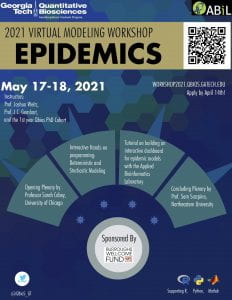 The COVID-19 pandemic has underscored the importance of understanding and modeling the dynamics of disease spread. Computational modeling has proven to be a key tool in our fight against the novel coronavirus, and helping to inform the implementation of public health interventions including physical distancing, mask-wearing, testing/tracing, as well as vaccination.
The COVID-19 pandemic has underscored the importance of understanding and modeling the dynamics of disease spread. Computational modeling has proven to be a key tool in our fight against the novel coronavirus, and helping to inform the implementation of public health interventions including physical distancing, mask-wearing, testing/tracing, as well as vaccination.
Are you a graduate student, scientist, or faculty member interested in learning how epidemic models such as the ones used to study COVID-19 are developed? If so, Professor Joshua Weitz, Professor James C. Gumbart, and the Quantitative Biosciences (QBioS) first-year cohort encourage you to apply to our 2021 virtual two-days workshop on epidemic modeling. It will feature:
-
An opening plenary lecture on the core principles behind infection and disease spread by Professor Sarah Cobey, University of Chicago.
-
Hands-on tutorials for implementing computational deterministic and stochastic models of epidemics. We will support Python, Matlab, and R.
-
Building an interactive dashboard to explore models of epidemics. The Applied Bioinformatics Laboratory (ABiL) will provide a session using R Shiny.
-
Concluding plenary lecture by Professor Sam Scarpino, Northeastern University.
We welcome applications irrespective of prior coding experience. The workshop will include an introductory programming session (Python, Matlab, or R) for those with limited (or no) coding experience. More advanced coders will have the chance to participate in a paper discussion. All participants will learn the basics of developing deterministic and stochastic models of epidemic spread, as well as how to translate core principles into interactive dashboards.
We will provide same-day support for coding in three languages: R, Python, and MATLAB.
We thank the Burroughs Wellcome Fund for making this workshop possible and the Applied Bioinformatics Laboratory (ABiL) for organizing the dashboard session.
| Applications are now closed! |
| Please watch out for an email from us. Our response may be under spam! |
